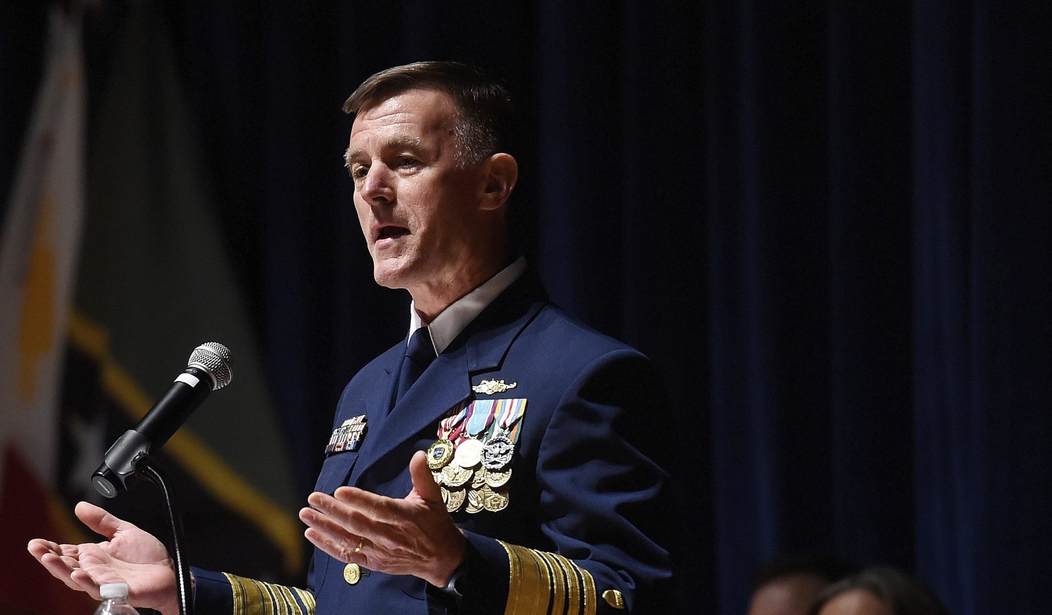The highest-ranking member of the U.S. Coast Guard seemed to openly defy President Donald Trump’s Twitter order excluding all transgender people from military service.
Commandant Adm. Paul Zukunft referenced Lt. Taylor Miller, the Coast Guard’s first openly transitioning officer, who was featured in a Washington Post profile last week. “If you read that story, Taylor’s family has disowned her,” Zukunft said at a Center for Strategic and International Studies event in Washington, D.C., The Hill reported.
“I told Taylor, I will not turn my back. We have made an investment in you and you have made an investment in the Coast Guard and I will not break faith,” Zukunft said.
Last week, President Trump announced in a tweet that “the United States Government will not accept or allow Transgender individuals to serve in any capacity in the U.S. Military.” He justified this action by insisting the military “must be focused on decisive and overwhelming victory and cannot be burdened with the tremendous medical costs and disruption that transgender in the military would entail.”
After consultation with my Generals and military experts, please be advised that the United States Government will not accept or allow……
— Donald J. Trump (@realDonaldTrump) July 26, 2017
This policy was an immediate rejection of the military policy under President Barack Obama, who repealed the “Don’t Ask, Don’t Tell” policy about homosexual service members. Under Obama, the Pentagon also allowed transgender soldiers, sailors, airmen, and Marines to serve openly, arguably turning the military into a social experiment.
In June, Defense Secretary James Mattis approved a recommendation by the service chiefs to delay the acceptance of transgender applicants into the military until Jan. 1, 2018. But Trump’s Twitter announcement reportedly took Mattis — and others, such as Joint Chiefs of Staff Chairman Gen. Joseph Dunford — by surprise.
Dunford has said the current transgender policy will remain unchanged until the White House sends an official directive to the Pentagon, which reportedly has not yet happened.
Immediately after Trump’s Twitter declaration, Zukunft said he and his staff reached out to the transgender members of the military. “The first thing we did is we reached out to all 13 members of the Coast Guard who have come out (as transgender),” Zukunft said.
“That was the commitment to our people right now,” he explained. “Very small numbers, but all of them are doing meaningful Coast Guard work today.”
While the Coast Guard operates under the Department of Homeland Security, it is a branch of the U.S. Armed Forces and would fall under the transgender ban, were it to be finalized. Zukunft reportedly reached out to now former Homeland Security Secretary John Kelly, who became White House chief of staff on Monday.
It may seem inclusive to allow transgender people to serve, but data suggests the current policy is fraught with danger.
In April of last year, the Endocrine Society reported that “among military veterans identifying as transgender, 90 percent have at least one mental health diagnosis, such as post traumatic stress disorder (PTSD) or depression, and nearly 50 percent had a hospitalization after a suicide attempt or suicidal thoughts.”
A 2011 survey by the National Transgender Discrimination Survey (NTDS) found that 41 percent of transgender people had attempted suicide in the U.S., compared with the mere 4.6 percent average national attempted suicide rate. A 2013 survey by the Iraq and Afghanistan Veterans of America found that 30 percent of U.S. veterans have considered suicide, and 45 percent said they know an Iraq or Afghanistan veteran who has attempted it.
Trump’s policy, if indeed it will be finalized, will likely be developed in such a way as to either allow existing transgender members to serve out their terms or to be phased out over time. The military often turns away people who want to serve for a vast panoply of medical issues, and gender dysphoria does make sense as another one of those disqualifying factors.
Zukunft may hold Trump’s policy in contempt and he may try to defy it, but Trump is the commander in chief. He should not have announced this new policy by tweet, but his orders stand. The Coast Guard has no ground to defy them, should they be finalized.









Join the conversation as a VIP Member